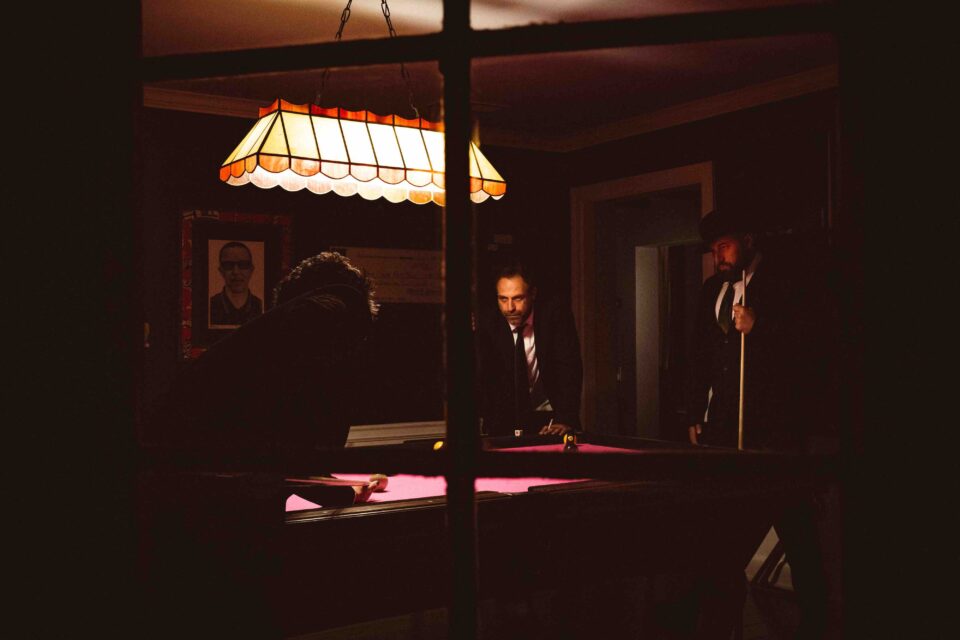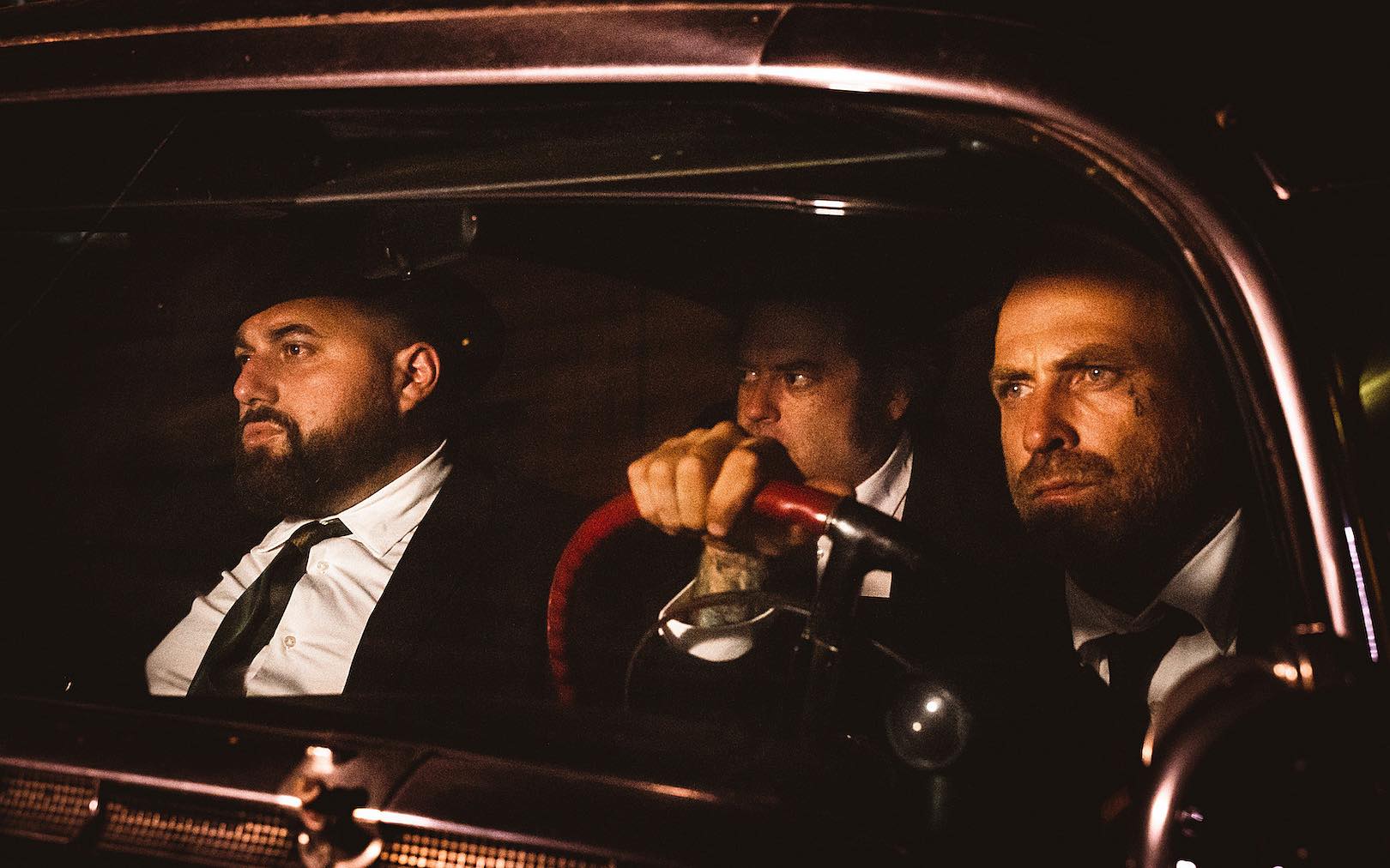It would make a great sitcom: NOFX’s Michael “Fat Mike” Burkett uproots to Las Vegas after a break-up along with two other recently single musicians, who also happen to be ex-cons. They move into a giant house together, start a band, and hilarity ensues. It would make a great sitcom, but it’s not—it’s real life. Sort of.
The timeline is skewed a little because the band, Codefendants, came together before the move to Vegas, and Fat Mike isn’t really in the band, but all the other elements are in place. Well, apart from the comedy aspect. At least onstage and on record. Behind the scenes, as the three of them—Burkett, Ceschi Ramos and Sam King—discuss how they feel about the project’s debut album, This Is Crime Wave, it’s kind of hilarious. At the time of the conversation, Crime Wave isn’t out yet. The band, to use a metaphor that suits what they’re about to say, are still in labor, but the baby is cresting.
“It feels pretty good,” says King over Zoom in his distinctive lisp from a room in the mansion, two tears and an upside down cross permanently falling from the tear ducts of his left eye.
“We’re like three proud dads,” says Burkett from the inside of what looks like some kind of limousine, his Listerine-blue hair and the leopard-print headliner both shrieking “Las Vegas.” “We’re just happy that our kid isn’t retarded.”
“It’s a weird little kid, that’s for sure,” smiles Ramos, who’s also speaking from inside a car (but not a limo).
“Yeah,” says Burkett. “It’s a fucking mixed-up individual.”
The child, to continue the metaphor, was conceived when King, who fronts punk outfit Get Dead, invited Ramos—a rapper/folk-punk songwriter who formed the alternative hip-hop label Fake Four Inc. with his brother David in 2008—to sing on one of his band’s songs, “Abscessed.” A while later, Burkett came on board in a sort of producer role (he plays bass on the album, though he doesn’t play with Codefendants live) and the one-off collaboration became a full-fledged band.
Before anyone gets offended by the proverbial elephant in the automobile, yes, Burkett’s use of the R-word is politically incorrect. But it’s precisely that kind of thing that’s defined his reputation—simultaneously building and (deliberately) tarnishing it—since he formed the seminal and often controversial punk band NOFX way back in 1983. Whether onstage or off, Burkett is known for antagonizing people. So while using that word is very much part of his shtick, the real Mike Burkett is actually deeply empathetic and altruistic.
“It feels good to fucking have somebody put it into words and be like, ‘OK, I’m not crazy, that is how this feels out here’—if it stops one person from driving their car off the cliff, then it’s good.” — Sam King
That’s a personal opinion shaped from numerous interactions with him over the years, but one corroborated by Ramos and King, both of whom credit him with essentially saving their lives. Not just because of his involvement in this project that they’d started, nor just by offering them both a place to live at his Las Vegas house, the city he now calls home and where he’s recently opened up the Punk Rock Museum. It’s more profound than that—especially for King, who was facing time inside. “I got into some shit in Hollywood,” he shares of an incident that resulted in three felony assault charges and three charges of intimidation of witnesses. “They were trying to give me two years right off the bat.”
This is when Fat Mike “came through,” he continues. “Ceschi and I had just made ‘Abscessed’ and we came down to record it. I got out of jail, and we went right to Mike’s house for this meeting and Mike offered to produce. He was like, ‘Yo, if you guys need development money to do this, let me know.’ Ceschi thinks about things a little through-er than I do, and he was like, ‘Maybe instead of trying to get an advance, you should ask him if he’d be willing to help you with your fucking lawyer bills.’ So we went in there and fucking said that shit and Mike said, ‘No problem! Got you!’—until, like, two days later when the lawyer called him and he was like, ‘What did you do?’ I was like, ‘This ain’t a skate ticket.’” He grins widely, revealing a missing tooth in the middle of his smile, then continues. “But I owe pretty much everything I have right now to Ceschi and fucking Fat Mike, because they held me down when all that shit fucking went down.”

“I feel the same about you, though,” says Ramos. “I wouldn’t be here at all if it wasn’t for Sam. I reached out to him, and it turned out we knew people in common from the same hip-hop and punk scenes. I look at Sam as the reason for fucking keeping me alive, and my fucking career as well. But we live together because Fat Mike had a break-up, so he was like, ‘Fuck it, I’m moving from LA and I’m getting this house in Vegas and you both have rooms there.’ He was like, ‘Let’s make these records, let’s bring the studio there.’ He just was so serious.”
And so, here they both are, living in the kind of house they never could have imagined in their wildest dreams. “We’re in this ridiculous fucking house!” chuckles King. “You can’t even look at yourself in the mirror and not just fucking be like, ‘What are you doing? I’m not supposed to be here.’ We have a thing here in the fucking house where somebody’s in a bad mood or bitching about something, you’ll just hear somebody scream from the other end of the house: ‘This mansion is a prison!’ And no matter how bummed out or mad you are, you have to take that second to reflect about that echo that just hit you in the face.”
“Yeah,” says Ramos. “You’re screaming that while looking at your waterfall or some shit.”
“I started a Match.com account,” says King, “and it’s just a picture of our fucking waterslide.”
“It’s a life-changer,” adds Ramos. “This band is a complete fucking life-changer.”
“I grew up with a drug-addict father and I was a drug dealer most of my life, and I went to prison for it. All of us have been around those worlds—those aren’t just political points to talk about for us.” — Ceschi
That doesn’t stop King and Ramos ruminating on the tough times, though. This Is Crime Wave paints an incredibly visceral picture of life behind bars—specifically King’s experiences (he’s been to jail “a thousand times,” he told Burkett on his Fat Mike’s Fat Mic podcast), as well as Ramos’. After a drug bust in 2010, Ceschi was sentenced to four years in prison. That was then reduced to 18 months, of which he ended up serving four before being allowed to return home on house arrest.
The record doesn’t just focus on life inside, but also the problems and injustices outside that so often lead to incarceration—the disparity of wealth, the inherent racism at the heart of American society, the opioid epidemic, the corruption that’s infested the justice systems and police departments all over the country, a for-profit healthcare system, the military- and prison-industrial complexes, and, at the root of it all, the capitalist system that proudly props all of that up. It’s also infused with a surprisingly tender dose of heartbreak, stemming mainly from the break-up of King’s marriage (“The next record is actually more of a breakup record,” admits King. It’s also apparently nearly finished). Still, it’s present here, too, and the result is an unflinchingly raw depiction of a life that many are privileged enough to not experience, but one that, sadly, way too many do.
The initial pitch for our conversation was to go deep on the five-part video series the band released. Written by Burkett and directed by activist art collective INDECLINE, it tells a harrowing story of police power (and their abuse of it) in the US. But while the conversation starts with that subject, it becomes clear that the band aren’t particularly interested in contributing to an intentionally exclusive political narrative. “I think the balance lies in not going all in on, like, ‘This is all we’re about,’” says King. “Mike made a good treatment for the videos, but I think that Codefendants is more like therapy for other people that feel like they’re fucked. It feels good to fucking have somebody put it into words and be like, ‘OK, I’m not crazy, that is how this feels out here’—and if it stops one person from driving their car off the cliff, then it’s good.”
“For me, at least,” says Ramos, “the video treatments and ongoing themes on the record were dealing with our own experiences within the system. We wanted to present our perspective on how to deal with it and navigate from within, while also trying to be examples to younger people or people who’d never experience that. I think our lyrics kind of touch upon that quite a bit. And I think in the end the video series is talking about how the bullies and the hateful are called heroes, and how the pawns of power are paid by us to protect us—there’s no winning when there’s systemic failure.”
“We’re all criminals and we’re drug addicts, so I think we know pretty well to speak about these things.” — Fat Mike
Therein lies the crux of this record, this band. While their very existence, as well as everything addressed on This Is Crime Wave, is to at least some degree political, it’s really just about their actual lived experience. Is there a redemption arc here—a “golden moment,” to use sitcom terminology? Not really, because life doesn’t always have redemption arcs, though Burkett certainly brought both of them back from the brink of somewhere not particularly good. It’s just real life—their real lives—and they’re just telling their truth about them and the system they exist in. “We’re all criminals and we’re drug addicts,” says Burkett, “so I think we know pretty well to speak about these things.”
“Speak for yourself!” cries Ramos in fake indignation.
“I mean, we’re not reading books about it,” smiles Burkett. “We’re living it.”
We’re just sharing experiences that we’ve gone through,” Ramos adds. “Like, even if I’m not a drug addict, I grew up with a drug-addict father and I was a drug dealer most of my life, and I went to prison for it. All of us have been around those worlds—those aren’t just political points to talk about for us.”
He shakes his head and looks away from his camera, a tinge of profound sadness in his voice. Perhaps it wouldn’t make such a great sitcom after all. But despite everything, there’s still some humor to be found in this wretched life, this unjust system. When asked what they get out of the band, the responses are telling. “I guess I get to look in the mirror and see I’m not a little bitch,” says King.
“It’s therapeutic for us,” offers Ramos. “Like Sam said before, if that can reach anybody and speak for anybody who’s voiceless, that’s our goal.”
There’s a pause, then the screen cuts to Burkett in his limo. “When I look in the mirror,” he says, “I do see a little bitch.”
Everybody laughs as if they haven’t got, and have never had, a care in the world. FL







